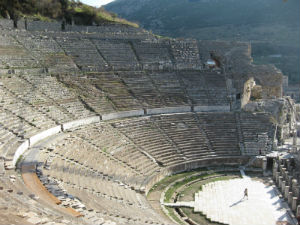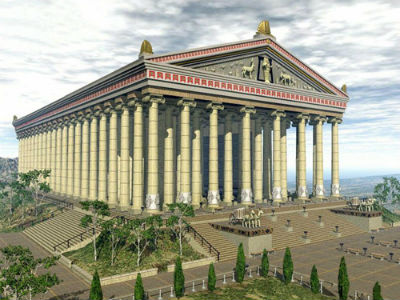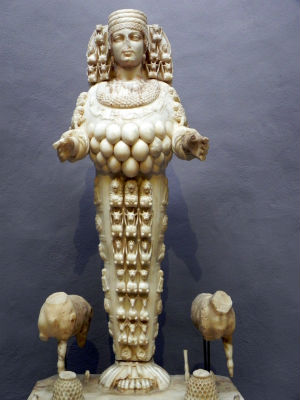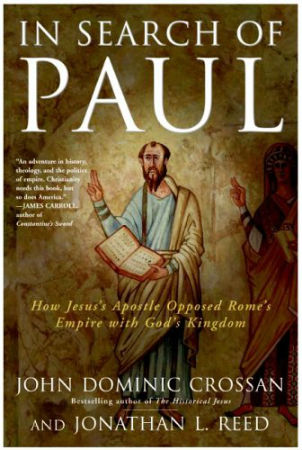
By Neil Earle
If any place could be considered Satan’s stronghold in the filthy rich Roman Empire of the First Century it would have to be, in addition to Rome itself, the mighty city of Ephesus.
Ephesus was on the west coast of today’s Turkey. It was a grand city of some 225,000 people in New Testament times. The great trade route across the Euphrates and following the Silk Road to China reached Ephesus. The city was ideally situated at the mouth of a river, such as New York or Vancouver today with a rich bustling hinterland behind her.
This bustling trade made Ephesus “the most magnificent of the magnificent cities if Asia.” Its lists of “firsts” were second to none:

Into this center of wealth, vice, witchcraft and sensuality in 52 AD came the little Jewish tentmaker. Paul had major demonic encounters in Ephesus, battles which he won (Acts 19:18-20).
Paul’s attacks on idolatry and magic were striking at the city’s trade and commerce. Demetrius the Silversmith roused the city against Paul and roughly treated his companions in the huge theatre. Paul wanted to address the crowds there but was held back – wisely. For two hours the angry mob shouted “Great Diana of the Ephesians.” You can read all this in Acts 19.

Years later, while under house arrest in Rome, Paul thought of his brothers back in Ephesus. He knew what they were up against every day with that enormous temple and Diana’s ugly statue (pictured, left) dominating everything and the soothsayer and fortune-tellers in abundance. Paul was motivated to draft the Letter to the Ephesians and it turned out to be one of his most memorable writings, as well as a highlight of world literature.
As we continue our study of the Holy Spirit, we can discern five clear references to the Holy Spirit amid so many engaging, out-of-this world concepts.
Paul starts out this letter with a prayer that seems to last three chapters. He starts with the word “Blessed” and then follows it with another phrase he will repeat five times – “the heavenly realms.”
Pau rehearses the basic facts of salvation from verses 3-14 as if he is determined to remind the Ephesians what wonderful things salvation entailed. This includes being chosen ahead of the rest of the world (“predestined” is his word), redeemed through Christ’s blood (an essential reminder to all of us), receiving the gift of forgiveness (who can ever forget that?) and – something new – being let in on what God’s plan was in Christ.
Just what was that divine purpose in history?
It is, says Paul, a purpose “to be put into effect when the times will have reached their fulfillment – to bring all things in heaven and earth together under one head, even Christ” (Ephesians 1:10).

Paul is deliberately countermanding the influence of so much ruinous pagan conformity in Ephesus. The Romans had unified the world through commerce and brutality. The magicians of Ephesus had kept the populace deceived under pagan trickery. The temple prostitutes had diverted people with pleasure. But amid all that God was working out his plan through his own people in Ephesus.
Ephesus was a place where size and bigness mattered so Paul starts out with the Big Picture and never let go.
Paul then reviews what God has done for Christians through the Holy Spirit. The Holy Spirit opens our eyes to the greatness of our inheritance. He is the seal from God of our ultimate future (1:13-14). The Holy Spirit gives Christians mind-changing renewal directly from the Father and the Son (1:17).
The Holy Spirit’s role is to bring important things back to our remembrance. Now Paul reminds the Ephesians that God has put more power at the Christian’s disposal than even Ephesus can muster. That evidence is the resurrection of Christ from the dead (1:19-21). Paul knew what the Ephesians needed to remember – that Herod could not kill the infant Jesus, that the Roman cross could not stamp out his influence, that the Jewish hierarchy could not explain away his empty tomb and that the philosophies and priesthoods of the Roman world could not stop this message from spreading.
“Jesus is the head” Paul reiterates, “over all authority, power and dominion not only in this world but in the world to come.” Sure enough, today Ephesus is a city of wonder – of wonderful ruins! The great harbor silted up and the city lost its economic stranglehold on Asia and all was lost. Great Diana’s temple lies today in ruins.
So who really is Lord of history, Paul was asking. Today, our interest in Ephesus lies in the fact that the city is mentioned in the New Testament. How ironic.
But Paul is hardly finished yet. Paul remembers the grandiose temple at Ephesus, one of the seven wonders of the ancient world. But that also makes him think of another temple at Jerusalem, a temple that Jesus said was supposed to be a house of prayer for all nations but that had degenerated into a monument to Exclusivity and Prejudice.
Paul combats this by a remembrance of the unity Christians have found in Christ. Jews and Gentiles were worshiping and fellowshipping together in one place – the Church. The Church, said Paul, with the temple of Diana perhaps on his mind, the church is the living temple made up of people in whom Christ resides through the Holy Spirit. This is the way peace will come to the world, argues Paul, not through a Roman sword but through submission to God’s will in Christ. Gentiles in Ephesus were once alienated from God and from the Jewish synagogue but are now “being built together to become a dwelling in which God lives by his Spirit” (2:22).
Wow! How often do we think about this? But what an antidote to the false spirit of unity that ruled in Ephesus – one that was Roman, commercial and demonic.
In some ways the Ephesians letter sums up all of Paul’s thinking. Thus in Ephesians 3:1-9 he shows again that the Mystery Religions of the Roman Empire cannot understand God’s purposes as revealed through the Holy Spirit, that God intends the unity of the human race though Christ. This is at the heart of Paul’s message, that “through the gospel the Gentiles are heirs together with Israel, members together of one body and sharers together in the promise of Jesus Christ” (3:6).
Contemplating a purpose so great drives Paul to his knees yet again. He prays majestically in 3:14-19 that the Ephesians will be strengthened with power through the Spirit in their inner being, that they will deeply grasp what God is working towards in the church and in their lives. The Christian journalist Sir Philip Gibbs put it this way: “Modern progress has made the word a neighborhood: God has given us the task of making it a brotherhood. In these days of dividing walls of race and class and creed we must shake the world anew with the message of the all-inclusive Christ, in whom there is neither bond nor free, Jew nor Greek, Scythian nor barbarian, but all are one” (Quoted in Barclay’s Daily Study Bible: Galatians and Ephesians).
Verse 19 is perhaps one of Paul’s greatest intellectual inspirations. He asks that the Ephesians will keep in mind the possibility through the Spirit of being “filled to the measure of all the fullness of God.” What can we add to such a statement except that when we stir up the Holy Spirit through prayer and service and right worship that we sometimes are given a glimpse of what Paul calls the width and breadth of what God is doing though the church (3:18).
In Ephesians 4:1-3 Paul reviews again how these grand purposes will be accomplished. The unity Christians display that points towards the unity of the human race under Christ, this is possible only because it is in fact the “unity of the Spirit.” In a remarkable phrase from the Old Testament, Paul shows that our failed efforts to keep this purpose before us “grieves” the Holy Spirit. This is what happens when commercial zeal saps our interest in the things of God, when the omnipresent media of TV and Twitter become – like Diana’s temple – more real than the things of God.
Addiction to the pursuits and pleasures of the passing parade we call the world can divert us from the cause of God as much as wine diverts the drunkard. Paul thus counsels in Ephesians 5:18 to “not get drunk on wine, which leads to debauchery. Instead be filled with the Spirit. Speak to one another with psalms, hymns and spiritual songs.”
There was much debauchery in Ephesus. There is much of it around today, a lot of it trying to enter our TV screens and in popular music. These human-induced distractions can seem all-encompassing, so much so that we think that there is the ultimate reality. But no. It has been Paul’s purpose in the Ephesian letter to show that the greatest things of all go on behind the passing show, they come from the heavenlies.
So Paul shows how to strike back at the distracting influences. There is the “sword of the Spirit” which is the word of God (6:17). The sword cuts and it can slash through the daily distractions that pose as ultimate reality – such things as medical worries, family concerns, soccer schedules, work challenges, school pressures and the sheer cussedness of the people we encounter on the subway or the freeway.
Don’t be deceived, says Paul. This is not the only reality. How right he was. Ephesus is gone, the Church endures. Life in Ephesus is not what we were made for. Living in the Spirit means we are helping build a temple that will never fall. The Spirit brings back to our remembrance those things we need to hear that can help us succeed spiritually even if we live amid Satan’s Sronghold. That is God’s promise to you and to me.